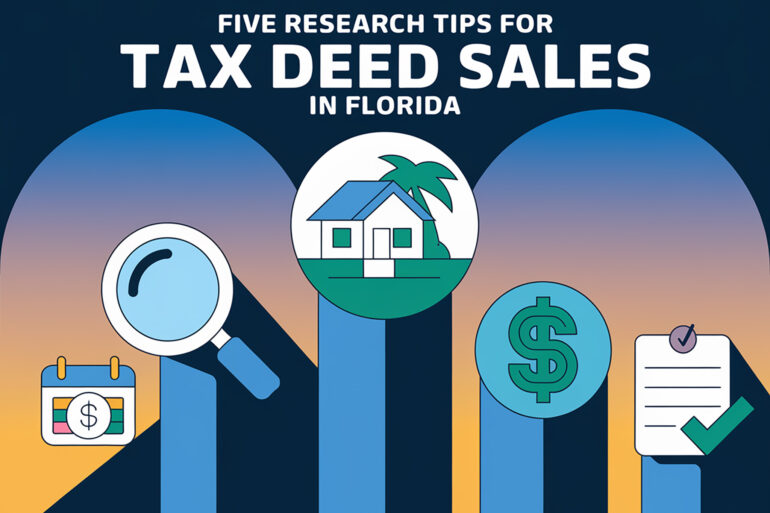Five Research Tips for Tax Deed Sales in Florida
Mastering Florida tax deed investing starts with research. Before you bid on a property, you must understand the tax deed process, research the market, evaluate properties for auction, and prepare exit strategies. Read on to learn how to do this and more!
What Is a Tax Deed Sale?
A tax deed sale refers to the sale of a tax-delinquent property by the city or county.
When a homeowner fails to pay their property taxes, the government places a lien on the property. If, after a certain period (two years in Florida), the tax lien remains unpaid, the government can seize the property and auction it off to the highest bidder, starting with a minimum bid of the outstanding taxes plus interest and fees.
The tax deed sale proceeds are then used to satisfy the outstanding tax debt. Any excess sale proceeds can be paid to the original homeowner if requested. However, they must request these funds within a certain timeframe (120 days after the date of the mailed Notice of Surplus in Florida).
The tax deed process can be complex, but it’s important to know it inside and out.
Why Invest in Tax Deed Properties?
For investors, buying a tax deed property can be a lucrative venture.
For one, the governments holding these properties are primarily interested in recouping the taxes owed to them. Anything more is reserved for the homeowner. This means you can often buy tax deed properties at a steep discount from their full value.
Furthermore, fewer homebuyers know about tax deed properties, which can lead to less competition overall and lower prices. Even among real estate investors, tax deed investing is a relatively small niche. In short, tax deed sales offer a high potential ROI.
Five Research Tips for Investing in Tax Deed Properties
That said, you shouldn’t bid on the first tax deed property you see, nor even at the first auction you go to. To be a successful tax deed investor, you must first do your research:
1. Understand the Tax Deed Process
The tax deed process can be complex, but it’s important to know it inside and out.
For example, do you know the difference between a tax deed and a tax lien? A tax lien is the initial legal claim issued against a property when the owner fails to pay their property taxes by a certain date. In Florida, property taxes are due on November 1, and if they’re not paid by April 1 of the following year, the government issues a tax lien.
In some states, including Florida, investors can buy tax liens by paying off the tax debt, making them the creditor to whom homeowners are indebted. If the debt isn’t paid off after two years, the property is auctioned off to the highest bidder in a tax deed sale. Typically, bidders are required to pay in cash within one business day.
Unlike with other types of real estate purchases, you can’t inspect a tax deed property.
2. Research the Tax Deed Property Market
To see what tax deed properties are on the market, request a list from your county or city government. From there, you can filter the list based on your investment criteria.
For example, are you looking for properties with a minimum bid price below a certain threshold, only 3-bedroom single-family homes, or properties within certain zip codes? Whatever your search criteria, use them to narrow your options.
The truth is there are many tax-delinquent properties out there. The trick is finding the ones that will make for a good investment.
The worst thing you can do is overpay for a tax deed property and be forced to sell at a loss.
3. Do Your Due Diligence on the Property
Once you have a short list of tax deed properties, it’s time to assess their condition, value, and potential ROI.
Keep in mind that a lot of time passes from when a homeowner first falls behind on their property taxes to when their property is up for sale. This means tax deed properties often need repair. After all, homeowners who can’t keep up with their property taxes likely don’t have the funds for proper maintenance (and sometimes also take out their anger over losing the home on the property).
Unlike with other types of real estate purchases, you can’t inspect a tax deed property. You must buy it as-is. However, that doesn’t mean you can’t drive by the property to assess its exterior or look up its tax history to check its past appraised value.
You may also want to view the property on Google Maps and a GIS mapping system to better understand its topography and structure. Dig up as much information as you can to get a fuller picture of what you’re buying.
Recognizing a good tax deed property deal takes time.
4. Prepare Exit Strategies
One of the biggest mistakes beginner tax deed investors make is buying without an exit strategy. But buying a property won’t do you any good if you can’t sell or rent it.
Before placing a bid, research how much you could realistically sell or rent the property for. This informs your potential ROI. If you can’t sell or lease the property at a profitable rate, then it’s probably a bad deal.
Don’t forget to factor in selling, renovation, holding, and other costs. The worst thing you can do is overpay for a tax deed property and be forced to sell at a loss.
5. Learn from Seasoned Experts
Recognizing a good tax deed property deal takes time. When you’re just starting, you lack the experience of more seasoned pros.
Consequently, it’s good to observe a few tax deed auctions before you make your first bid. See what other investors are bidding on and how much they’re offering. Then compare that to your own analysis.
Meanwhile, introduce yourself to other investors and build your network. Offer your help in exchange for their advice. Finding the right mentor can help you learn much faster than you could on your own.
Finally, consider signing up for PropertyOnion.com’s 1-on-1 Tax Lien & Tax Deed Investing training. It can teach you how to generate a safe 10-20% annual return starting with as little as $20. Many past students have gone on to make a lot of money from tax deed investing in Florida. Save your spot today!








